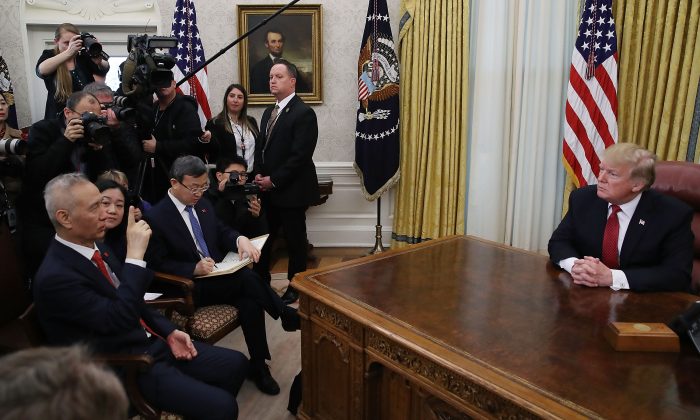WASHINGTON—The U.S.-China trade war is set to enter a new phase on Jan. 15 as U.S. President Donald Trump and Chinese Vice Premier Liu He sign an initial trade deal that aims to vastly increase Chinese purchases of U.S. manufactured products, agricultural goods, energy and services.
The Phase 1 agreement caps 18 months of tariff conflict between the world’s two largest economies that has hit hundreds of billions of dollars in goods.
Trump and Liu are scheduled to sign the 86-page document, at a White House event before over 200 invited guests from business, government and diplomatic circles.
A translation of the text to Chinese was still being completed late on Tuesday afternoon, as Liu met with U.S. Trade Representative Robert Lighthizer.
Trump has already begun touting the trade deal as a centerpiece of his 2020 re-election campaign, calling it “a big beautiful monster” at a rally in Toledo, Ohio last week.
“Our farmers will take it in. I keep saying, ‘Go buy larger tractors, go buy larger tractors,’” Trump said.
The centerpiece of the deal is a pledge by China to purchase an additional $200 billion worth of U.S. goods over two years to cut a bilateral U.S. trade deficit that peaked at $420 billion in 2018.
A source briefed on the agreement told Reuters that China will purchase an additional $80 billion worth of U.S. manufactured goods over the two year period, including aircraft, autos and car parts, agricultural machinery and medical devices.
Beijing will boost energy purchases by some $50 billion and services by $35 billion, while agricultural purchases will get a $32 billion lift over the two years, all compared to a 2017 baseline of U.S. exports to China, the source said.
When combined with the $24 billion in 2017 farm exports, the $16 billion annual increase approaches Trump’s goal of $40 billion to $50 billion in annual agricultural sales to China.
The deal could be a big boost to American farmers, planemaker Boeing, U.S. automakers and heavy equipment manufacturers.
 U.S. President Donald Trump, surrounded by business leaders and administration officials, prepares to sign a memorandum on intellectual property tariffs on high-tech goods from China, at the White House in Washington, D.C. on March 22, 2018. (Jonathan Ernst/Reuters)
U.S. President Donald Trump, surrounded by business leaders and administration officials, prepares to sign a memorandum on intellectual property tariffs on high-tech goods from China, at the White House in Washington, D.C. on March 22, 2018. (Jonathan Ernst/Reuters)Tariffs to Stay
The Phase 1 deal, reached in December, canceled planned U.S. tariffs on Chinese-made cell phones, toys and laptop computers and halved the tariff rate to 7.5 percent on about $120 billion worth of other Chinese goods, including flat panel televisions, Bluetooth headphones and footwear.
But it will leave in place 25 percent tariffs on a vast, $250 billion array of Chinese industrial goods and components used by U.S. manufacturers.
Lighthizer and Mnuchin moved to stamp out suggestions that the United States and China may review possible removal of more tariffs after the November U.S. election, issuing a joint statement that there were no written or oral agreements for future tariff reductions.
Mnuchin later told reporters that Trump could consider easing tariffs if the world’s two largest economies move quickly to seal a Phase 2 follow-up agreement.
Core Issues Untouched
The deal includes pledges by China to forbid the forced transfer of American technology to Chinese firms as well as to increase protections for U.S. intellectual property.
But it stops well short of addressing the core U.S. complaints about China’s trade and intellectual property practices that prompted the Trump administration to pressure Beijing for changes in early 2017.
The deal contains no provisions to rein in rampant subsidies for state-owned enterprises, which the administration blames for excess capacity in steel and aluminum and says threaten industries from aircraft to semiconductors.
It also fails to address digital trade restrictions and China’s onerous cybersecurity regulations that have hobbled U.S. technology firms in China.
Mnuchin and Lighthizer said these issues are key U.S. priorities for Phase 2 negotiations with China.
Financial Services, Currency, Enforcement
China has agreed in the Phase 1 deal to open its financial services sector more widely to U.S. firms, and to refrain from deliberately pushing down its currency to gain a trade advantage, the latter prompting Treasury to drop its currency manipulator label on Beijing.
While China has made such pledges in the past, a key difference that the Trump administration is touting is an enforcement mechanism to ensure compliance and resolve disputes.
But the enforcement relies on reimposition of tariffs if disputes cannot be resolved, returning the two countries to the current status quo.
By David Lawder
This article is from the Internet:US, China Set to Sign Massive Purchases Deal, Easing Trade War
Iran Bulldozed the Grave of Executed Christian Pastor: Family
